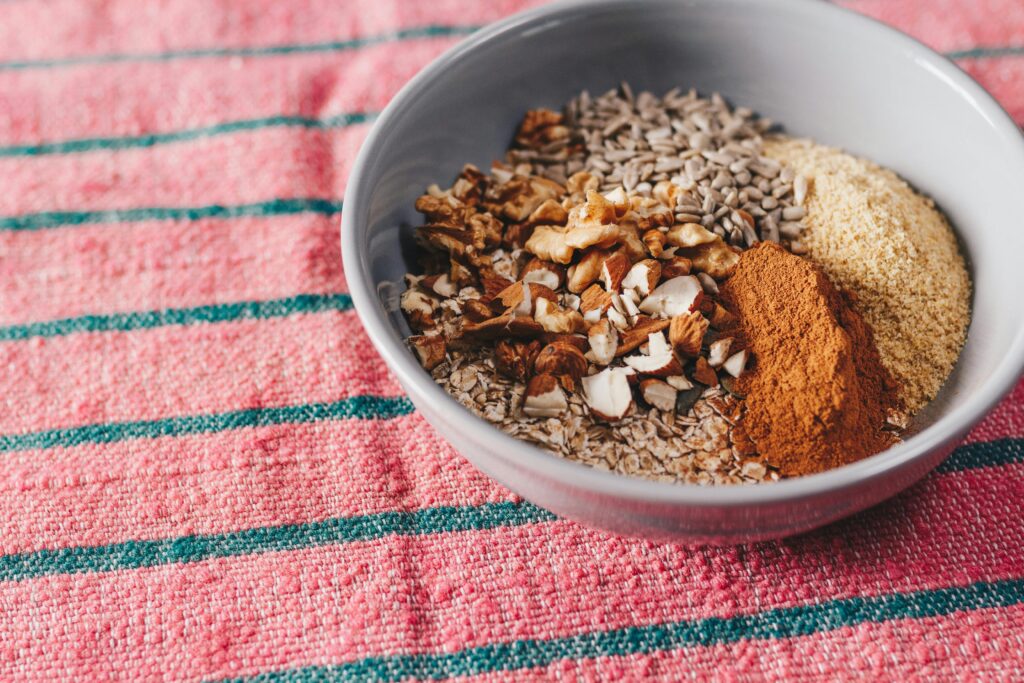Flaxseed (Linum usitatissimum) has gained widespread recognition as a superfood packed with essential nutrients. This tiny seed is rich in omega-3 fatty acids, fiber, and lignans, all of which contribute to overall health and, more specifically, heart health.
With cardiovascular disease being the leading cause of death worldwide, incorporating heart-healthy foods into your diet is more important than ever. Research suggests that flaxseed may help lower cholesterol, reduce inflammation, and support weight management—all key factors in preventing heart disease.
But how exactly does flaxseed work? Let’s dive into the science behind its impressive benefits and explore how you can incorporate it into your diet.

The Nutrient Profile of Flaxseed
Flaxseed is available in multiple forms, including whole seeds, ground flaxseed (flax meal), and flaxseed oil. However, ground flaxseed is considered the best option for nutrient absorption.
Here’s what one tablespoon (7g) of ground flaxseed provides:
- Calories: 37
- Protein: 1g
- Carbohydrates: 2g
- Fiber: 2g
- Omega-3 fatty acids (ALA): 2g
- Thiamine (Vitamin B1): 10% of the Daily Value (DV)
- Copper: 9% of the DV
- Manganese: 8% of the DV
- Magnesium: 7% of the DV
Flaxseed is unique because it combines fiber, healthy fats, and plant-based antioxidants, making it a powerhouse for heart health and overall wellness.
How Flaxseed Supports Heart Health
1. Lowers Cholesterol and Triglycerides
High cholesterol is one of the biggest risk factors for heart disease. Fortunately, flaxseed has been shown to lower LDL (“bad”) cholesterol and triglycerides while increasing HDL (“good”) cholesterol.
In a 2019 clinical trial, 80 participants with high cholesterol and high blood pressure consumed 36g of flaxseed powder daily for eight weeks. The results showed:
✔ Reduced LDL cholesterol by 9%
✔ Lowered total cholesterol levels
✔ Significantly improved triglyceride levels
✔ Better regulation of blood pressure
Since a 1% decrease in LDL cholesterol is linked to a 1.2–2% lower risk of coronary artery disease, even small improvements can have a major impact on heart health.
2. Reduces the Risk of Atherosclerosis
Atherosclerosis is a condition where plaque builds up inside the arteries, restricting blood flow and increasing the risk of heart attacks and strokes.
Flaxseed contains alpha-linolenic acid (ALA), an omega-3 fatty acid, which plays a role in:
✔ Reducing arterial plaque buildup
✔ Slowing the progression of atherosclerosis
✔ Lowering inflammation in blood vessels
A 2020 research review highlighted that ALA has strong anti-inflammatory effects, making flaxseed an excellent dietary addition for those concerned about cardiovascular disease.
3. Supports Healthy Blood Pressure Levels
High blood pressure (hypertension) is known as the “silent killer” because it often shows no symptoms but increases the risk of heart attacks and strokes.
In multiple studies, flaxseed consumption has been linked to lower systolic and diastolic blood pressure levels.
A meta-analysis of 15 clinical trials found that eating flaxseed daily for at least 12 weeks reduced blood pressure by an average of 2 mmHg. While this may seem small, even a 2 mmHg reduction can lower the risk of stroke by 10%.
4. Aids in Weight Management
Being overweight or obese increases the risk of heart disease. Flaxseed can support healthy weight management by:
✔ Promoting satiety – The fiber in flaxseed expands in the stomach, keeping you full for longer.
✔ Regulating blood sugar – Stable blood sugar levels help control cravings and prevent overeating.
✔ Supporting metabolism – The healthy fats in flaxseed may aid in fat metabolism and energy regulation.
A 2022 clinical study found that 68% of participants who took flaxseed extract along with a low-calorie diet lost at least 5% of their body weight over 12 weeks.
While flaxseed isn’t a magic weight-loss solution, it can be a helpful addition to a balanced diet.
Additional Health Benefits of Flaxseed

1. May Reduce Cancer Risk
Flaxseed is one of the richest sources of lignans, plant compounds with potential anti-cancer properties.
Research suggests that flaxseed may help protect against hormone-related cancers, including:
✔ Breast cancer
✔ Colon cancer
✔ Skin cancer
✔ Blood cancers
Although human studies are ongoing, animal and test-tube studies suggest that lignans may slow tumor growth and reduce inflammation in the body.
2. Supports Digestive Health
Flaxseed is packed with both soluble and insoluble fiber, which benefits gut health in several ways:
✔ Soluble fiber feeds healthy gut bacteria, improving digestion.
✔ Insoluble fiber helps prevent constipation and promotes regular bowel movements.
✔ Flaxseed’s mucilage content creates a gel-like consistency, easing bowel movements.
Just one tablespoon of ground flaxseed provides 5-8% of the daily fiber needs for most adults!
How to Incorporate Flaxseed into Your Diet
Adding 1-2 tablespoons of ground flaxseed to your meals is an easy way to boost your heart health. Here are some simple ideas:
🥣 Blend into smoothies for extra fiber and nutrients.
🥗 Sprinkle over salads or yogurt for a crunchy texture.
🍞 Mix into oatmeal, soups, or baked goods for added nutrition.
🥄 Combine with water to use as an egg substitute in vegan recipes.
For maximum benefits, choose ground flaxseed instead of whole seeds, as whole flaxseeds may pass through your digestive system undigested, limiting nutrient absorption.
Precautions and Who Should Avoid Flaxseed
🚫 Pregnant and breastfeeding women should consult a doctor before consuming flaxseed.
🚫 People with hormone-sensitive cancers should use caution due to flaxseed’s phytoestrogen content.
🚫 If taking blood thinners or hormone therapy, check with a healthcare provider before adding flaxseed to your diet.
🚫 Start with small amounts to prevent digestive discomfort like bloating or gas.
Takeaway: A Natural Superfood for Heart Health
Flaxseed is a nutrient-dense superfood that offers numerous benefits for heart health, digestion, and overall well-being. With its ability to:
✅ Lower cholesterol and blood pressure
✅ Reduce inflammation and arterial plaque buildup
✅ Support weight management and digestive health
It’s a simple yet powerful addition to any diet.
If you’re looking for a natural way to protect your heart, start by incorporating 1-2 tablespoons of ground flaxseed daily.
However, as with any dietary change, consult your doctor or a registered dietitian to ensure it aligns with your individual health needs.
Review Score
-
Performance
-
Design
-
Flexibility
-
Durability










